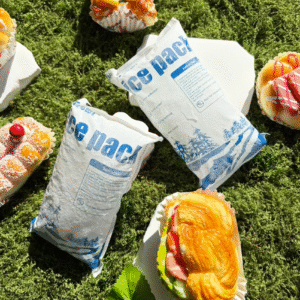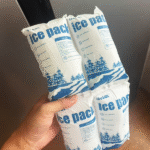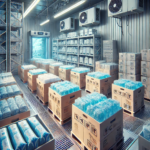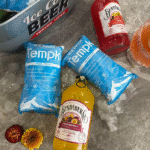Kühlketten: Was Sie über temperaturgeführte Logistik wissen müssen

In the world of logistics, Kühlketten play an essential role in transporting perishable goods like food, Arzneimittel, und medizinische Produkte. These temperature-controlled systems ensure that products remain within the required temperature range from the moment they are shipped to when they reach their final destination. Da der Markt für Kühlkettenlogistik weiter wächst, understanding its significance is vital for businesses that rely on these systems to ensure product quality and safety.
Why Are Cold Chains Crucial for Temperature-Sensitive Products?
Cold chains are specifically designed to address the unique needs of temperature-sensitive products, ensuring they remain safe and of high quality throughout their journey. Successful cold chain management relies on maintaining the correct temperature at each stage of the supply chain, whether in refrigerated trucks, Lagerhäuser, or storage containers.
Key Benefits of Cold Chains:
-
Preservation of Product Quality: Cold chains ensure that perishable goods such as food and medicine maintain their quality and safety by preventing spoilage and degradation.
-
Vorschriftenregulierung: Cold chains are crucial for meeting regulatory requirements, insbesondere in Branchen wie der Pharmaindustrie, where product integrity is governed by strict standards.
-
Effizienter Transport: Cold chain systems help streamline logistics operations, making it easier to transport goods quickly and safely over long distances.
How Do Cold Chains Work?
Cold chains involve a series of steps to maintain product temperatures throughout the logistics process. Here’s a breakdown of how these systems function:
-
Temperaturkontrollierte Lagerung: Cold storage facilities are equipped with refrigeration systems that maintain optimal temperature ranges to prevent spoilage or loss of potency.
-
Kühltransport: Goods are transported in vehicles such as refrigerated trucks, Eisenbahnwaggons, or containers, all of which have cooling systems that ensure temperatures stay consistent.
-
Überwachung und Verfolgung: Fortschrittliche Überwachungssysteme, often utilizing IoT sensors, track the temperature and humidity of goods in real-time, ensuring that products remain within the required range.
Benefits of Real-Time Temperature Monitoring:
-
Minimizing Product Loss: Continuous temperature monitoring helps prevent exposure to harmful fluctuations.
-
Ensuring Compliance: Real-time data helps businesses comply with regulations and ensures that products meet safety and quality standards.
-
Verbesserte Sichtbarkeit: Tracking shipments offers transparency, allowing businesses to identify and resolve potential issues before they affect product quality.
How Do Cold Chains Impact Different Industries?
Cold chains are crucial across several industries that rely on temperature-sensitive products. Here are some sectors that depend on cold chains:
1. Lebensmittelindustrie
The food industry is one of the largest consumers of cold chain services. Maintaining proper temperature during storage and transport is essential to prevent spoilage and ensure product safety.
-
Temperature-Controlled Trucks: These vehicles transport food items while maintaining the required temperatures to avoid spoilage.
-
Kühllagereinrichtungen: Warehouses with controlled temperatures ensure that items like meats, Molkerei, and produce stay fresh until they are ready for distribution.
2. Pharmazeutika
Cold chains are essential in the pharmaceutical industry, particularly for sensitive products like vaccines and biologics. Ensuring that these products remain at the right temperature preserves their efficacy and safety.
-
Vorschriftenregulierung: Cold chains ensure that pharmaceutical products comply with strict regulations, including those set by the FDA and GMP, which mandate specific storage and transportation conditions.
-
Global Distribution: Cold chains play a crucial role in the global distribution of vaccines and other medications, ensuring that products maintain their potency across borders.
3. Biotechnologie
Biotech products such as gene therapies and cell cultures are highly sensitive to temperature changes. Cold chains ensure that these products reach their clinical or research destinations without compromising their integrity.
-
Controlled Temperature During Transport: Advanced biotech products require very specific temperature conditions to maintain their quality during transport.
What Are the Latest Trends in Cold Chains?
Als technologische Fortschritte, cold chain logistics are becoming more efficient and sustainable. Hier sind einige der neuesten Trends:
1. Nachhaltigkeit in Kaltketten
-
Electric Delivery Vehicles: Many logistics companies are switching to electric refrigerated vehicles to reduce carbon emissions.
-
Energy-Efficient Cooling Systems: New refrigeration technologies are reducing energy consumption while maintaining optimal temperatures.
2. Blockchain -Technologie
Blockchain is enhancing transparency in cold chains by creating an immutable record of each step in the process, ensuring traceability and accountability.
3. Advanced Data Analytics
AI and machine learning are being used to predict demand, Lieferwege optimieren, and minimize waste. These advancements are helping businesses make more informed decisions and improve operational efficiency.
How to Build a Resilient Cold Chain in 2025
Cold chains are becoming more critical as global trade grows and consumer demand for fresh, high-quality products rises. To build an effective cold chain, businesses must focus on infrastructure, process optimization, und Echtzeitüberwachung. Here are some key components:
-
Temperaturzonen: Different products require different temperature zones—frozen, gekühlt, oder Ambient. Ensuring these zones are clearly defined is crucial for maintaining product quality.
-
Transportation and Warehousing: Ensure that transport units (Z.B., Kühlwagen) and cold storage facilities are equipped to maintain the required temperatures.
-
Überwachung & Rückverfolgbarkeit: Real-time sensors and automated alerts are vital to prevent temperature deviations. By using IoT devices, businesses can gain transparency and respond swiftly to any temperature excursions.
How to Optimize Your Cold Chain:
-
Assess Your Current Cold Chain: Perform a gap analysis to identify vulnerabilities in your logistics.
-
Investieren Sie in Technologie: Nutzen Sie die Echtzeitüberwachung, Ai, and blockchain to improve efficiency and traceability.
-
Setzen Sie auf Nachhaltigkeit: Consider investing in energy-efficient systems and eco-friendly packaging to reduce your environmental footprint.
Common Questions About Cold Chains
Was ist eine Kühlkette??
A cold chain is a temperature-controlled supply chain used to transport perishable goods that require specific temperature ranges to maintain their quality.
Why are cold chains important for the food industry?
Cold chains are essential to maintain the safety and freshness of food during storage and transport, preventing spoilage and ensuring regulatory compliance.
How do cold chains help maintain pharmaceutical product quality?
Cold chains ensure that pharmaceuticals, insbesondere Impfstoffe, remain within specific temperature ranges during transport and storage, Wahrung ihrer Wirksamkeit und Sicherheit.
Abschluss
Cold chains are vital for maintaining the integrity of temperature-sensitive products. Businesses that rely on advanced technologies, including real-time monitoring and temperature-controlled transportation, can ensure product safety, Verderb verringern, and comply with regulatory standards. By investing in sustainable cold chain practices, companies can reduce their environmental footprint while enhancing operational efficiency.
Nächste Schritte:
If your business depends on cold chain logistics, partner with a reliable provider who uses advanced technologies and complies with industry standards. Invest in sustainable cold chain solutions to improve your environmental impact and enhance your bottom line.
Über Tempk
Tempk is a leading provider of cold chain logistics, offering innovative solutions for temperature-controlled transportation and storage. Our advanced technologies ensure the safe transport of goods across industries like food, Arzneimittel, und Biotechnologie, while maintaining the highest product quality standards.
Looking to optimize your cold chain? Contact us for a consultation and discover how we can help streamline your logistics while ensuring product safety and compliance.























